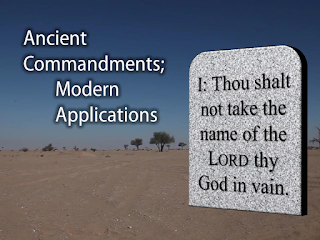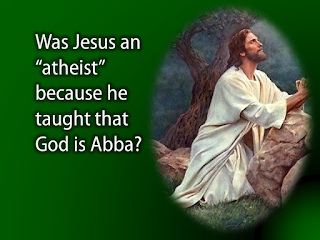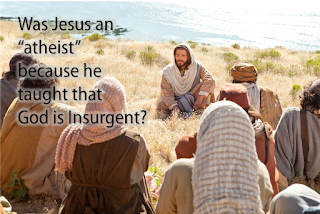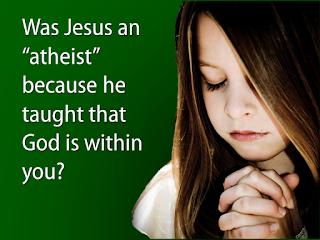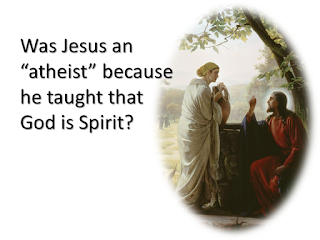Hespeler, 26 June, 2016 © Scott McAndless
Exodus 20:1-7, Matthew 5:17-20, 33-37, Psalm 119:1-8
S |
omewhere around 3500 years ago (as the story is told) there was a group of tribes wandering together through the desert when they encountered their God in a pretty remarkable way. And the God that they met in that desert apparently had some clear ideas about how ancient tribal people like them needed to live their lives and what they had to do. And so God gave them commandments – rules that they were supposed to live by. Even more important, he promised them that if they lived according to these rules they would be blessed and live good lives in a land to which he would lead them.
And they were good commandments and wise commandments. But they were also tailor-made for tribal people living somewhere about 3500 years ago. What I mean is that, for them, the application of the commandments was usually pretty straightforward. The situations that they came across in their normal lives were pretty much anticipated by the commands.
But today the world has changed. We don’t live as desert nomads or tribal people anymore, yet we still revere those ancient commandments. They are part of our Scriptures. Though, as followers of Christ, we don’t believe that we are justified by following commands (we are justified by grace through faith) we would still like to know that we are on the right side of these commandments, at least as much as we can be. But the application of a 3500 year old commandment may not always be so obvious in the world today.
For example, this morning we read one of the big ten – one that many Christians look at with a great deal of seriousness. It goes, in the best known translation of the King James Version, like this: “Thou shalt not take the name of the Lord thy God in vain; for the Lord will not hold him guiltless that taketh his name in vain.”
What did this commandment mean to the ancient tribal people who first received it and passed it on? It is a little hard to know. For one thing, they lived in a pre-literate society – a society in which very few people (if any) had any experience with the written word. And we know that pre-literate people thought about words very differently from how we do. The spoken word, for them, had remarkable almost magical power to shape reality. Words were alive. They sprang into being when they were spoken and they lived as long as people heard them and repeated them. Understand that we don’t see words in quite the same way that they did.
And it wasn’t just words. Names, in particular, had great power for them. The name of a person and how it was used was able to define and limit the power and influence that person had in the community. So the people who first heard this commandment had a pretty clear understanding of what it meant to take the name of their God and to use it in vain – to use the power of that name to support things that they had no business applying it to.
Application of the commandment was pretty straightforward for them. But, as you may have noticed, people have struggled with the specific application ever since – especially as people have sought to live it out in very different cultures where words don’t have quite the same powers and where names don’t quite mean as much as they once did.
For example, when Ancient Judaism went through a massive cultural shift (when they transformed from a largely illiterate society to one where reading and writing were valued and taught to everyone – which didn’t happen, by the way, until after the time of Christ – Jews began to apply this commandment in a very particular way. They became so worried about the possibility that they might misuse the name of God – perhaps even by accident – that they stopped using it altogether.
To this very day most Jews will not pronounce the name of God at all. When the ancient Hebrew name of God, which was probably pronounced something like Yahweh appears in the Scriptures, they simply will not read the name aloud and will substitute another word altogether. Many will even refuse to pronounce the English word God and the translations of that word into other languages too. I cannot think that it was ever the intent of the commandment in the original context to outlaw the pronunciation of certain syllables, but that is how later Jews made their peace with this commandment, perhaps out of an overabundance of caution.
And then, of course, there is the question of how Christians have dealt with it. I think if you were to ask most Christians today what it means to “Take the name of the Lord in vain,” they would probably say it has something to do with what we call cursing. They would say that it means that certain words and phrases are just out of bounds – at least in certain contexts. For example, it is not that we can’t say the name of God or the name of Jesus Christ but I certainly know Christians who frown on people saying, “Oh my God,” or “Jesus Christ,” when they are not actually praying, in church or in the midst of a theological discussion. In many ways, it is a similar response to the Jewish one except that, instead of not saying the name of God at all, we are just really careful about when we say it.
Of course, many will also push this just a little bit farther and apply this commandment to inappropriate speech in general. As you may have been told, there are certain words in the English language that you are just not supposed to say. They are words that are so bad, apparently, that I dare not tell you what they are – especially not here and now. Comedian George Carlin called them the seven words that you cannot say on television. You can’t say them in church either. I hope I don’t need to give you more information than that.
There is nothing wrong with the words themselves. They are just sets of sounds – the same sounds that are used in other languages with no offence. And they are not even strange or innovative words. They are, in fact, among the oldest words in the English language. People have been saying them for a very long time. Nor is there anything necessarily offensive in the meaning of the words. We have other words that we use to refer to the same things that are quite acceptable. Nevertheless, I know many Christians who would extend the rule about “taking the name of the Lord thy God in vain” to the use of such words.
So is that what it is really about – prohibiting the use of certain syllables? If the original commandment reflects, in any way, the real concerns of the eternal God, I have my doubts that God has that much of a grudge against certain words and certain syllables in certain languages. Words and manners of speaking are, above all, cultural matters. Certain words and expressions are acceptable within certain cultures and others are not.
While I am a great lover of the English language and would very much like to hear people use the language better than they do these days, I am very much aware that this comes from my own cultural bias. I know that, as a middle class white man who is a lifelong Christian, I have learned a bias against certain ways of speaking.
And some of this is actually problematic. There can be a not so subtle racism to it. Some of the words and phrases that we might call “taking the Lord’s name in vain” are simply expressions that belong to a culture that is not our own: maybe the black inner-city culture, another generation or another economic group. I think we are on dangerous grounds when we begin to treat cultural differences as matters of morality. So I really have some questions about how we have traditionally treated this particular commandment.
But I do believe that even ancient commandments like this one matter. I do believe that, in this commandment, there is wisdom that we need to figure out how to follow if we are going to thrive in the world today. That is what these commandments are for. So is there a way to understand and live out this commandment without becoming obsessed with certain words, certain combinations of sounds and certain syllables? It is a commandment that is intended, clearly, to instruct our speech, but, as far as I am concerned, it has to be about more than just the surface or the incidental sounds of that speech.
Remember that ancient people did believe in the power of words, especially in the power of a name to shape and to change reality. In this, they may well have been wiser than us. Words are more powerful than we often realize. What if this commandment was given to caution us more about how we speak than it was to prohibit certain words and sounds? Is that a radical idea?
Let’s say that you have issues with certain people in your community – people who are different from you in some way. It happens often enough. Maybe you struggle to understand a people who come from a different race, a different culture or background. Maybe it is because they are new to your place and don’t understand you or people like you. That is understandable. It is a thing that happens often enough in this world and that we all have to work through from time to time. I don’t necessarily see a problem with that, if you are working on it.
But what if, instead of working towards greater understanding, you just decide that it is you against them (whoever they are). And, what’s more, you decide that God is on your side against them. Suddenly, because you have adopted this mode of speaking, understanding has become impossible. Do you know what you have done? You have just taken the powerful name of God and applied it to an empty thing. You have taken the name of the Lord thy God in vain.
In fact, if you reject anybody, it doesn’t matter who they are, who is simply being the person that God created them to be, who is just trying to be true to themselves even though that may be uncomfortable to you, what have you done? Were they not created in the image of God just as you were? If you are denying who they are, are you not also denying the image of God within them? And if you are doing that, aren’t you taking the name of the Lord thy God in vain?
If you use God and the name of God, to accomplish something that serves yourself above all else, if you use that name to convince people to hate others and go to war against them, if you use the name of God to demonize people just because you don’t see things like they do, are you not taking the name of the Lord thy God in vain?
If you say “God bless my country” to the exclusion of all others, if you demand that God make your team win the game, if you proclaim that God is on your side, are you not making your country, your team and your side to be the master over your God? Are you not taking the name of the Lord thy God in vain?
What we say matters. The ancient Israelites certainly got that right. You can do more harm with a few misplaced words than you can do without just about anything. This powerful commandment could go a long way towards teaching us to be cautious about using the name of God to achieve our own goals, gain our own power or to bring other groups or individuals down.
What do we do with this commandment? Traditionally we just use it to police polite language. I am not so sure that the great Lawgiver would be impressed with how we use it. If we really took the application of this commandment to heart, I believe it would lead us to a new concern for how use our language about God for good and not for ill in this world.#TodaysTweetableTruth Taking the name of the Lord thy God in vain: about outlawing bad words or how we use God to achieve selfcentred goals?
